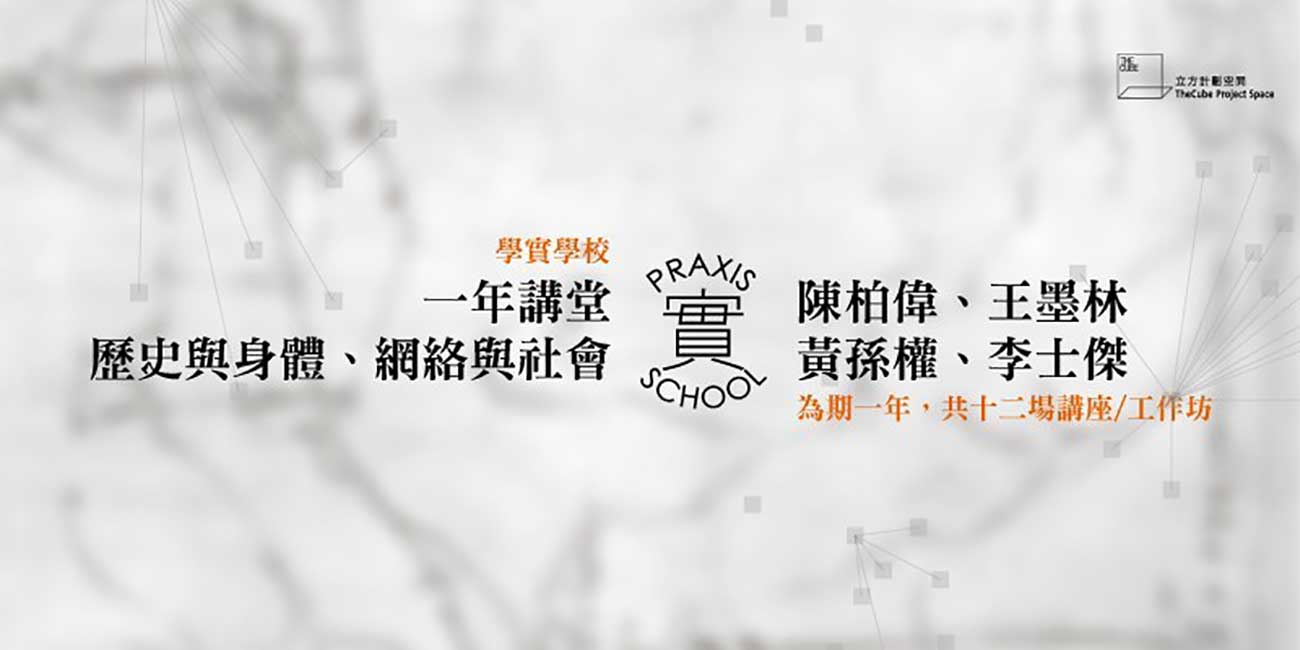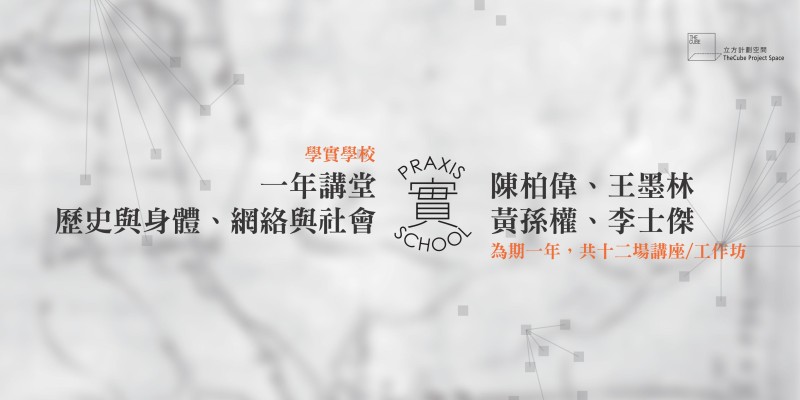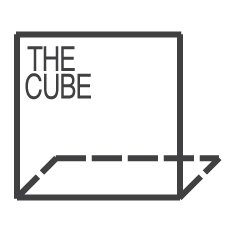
2017 Praxis School: History and Body, Network and Society
The 2017 Praxis School invites four social practitioners/cultural researchers to serve as the lecturers in three thematic sessions. Po-Wei Chen, the founding leader of the former Black Hand Nakasi – Workers’ Band, leads the first session Body, Space and Memory (incl. three workshops), followed by The Historical Context in the Cold-War Structure (incl. three lectures) that small-theater director and cultural critic Mo-Lin Wang curated as the second. Organized by cultural researcher Sun-Quan Huang and Internet activist Shih-Chieh Ilya Li, the third session Network and Society (incl. six lectures/workshops) is scheduled for launch in the second half of 2017.
Guiding the participants to read, discuss and collaborate, the total of twelve lectures/workshops encourage the former to treat their personal experiences as the point of departure, setting out on an intellectual journey across history, corporeality and collective consciousness with the contemporary experiences of survival as the vehicle in the age of cyber-space and cyber-community.
▌Session 1: Body, Space and Memory
Lecturer: Po-Wei Chen
Retrieving History and Memory from Bodily and Spatial Perceptions
The memory of repression, whether self-imposed or not, may come flooding back, and the social disciplines of all stripes constitute an influential force in shaping our bodies. Our bodies, senses and memories are ineluctably affected by a combination of political, economic and social factors, which is why we possess distorted perceptions or tend to turn our back on the happenings in the world. Some people are in the know on such distortion, while others have never been aware of it.
#1-1
Workshop 1: Returning to the Body
Date: 25th Mar., 2017
Participants in this workshop are required to chronicle their own physical and mental histories and then revisit their bodies under the lecturer’s guidance.
#1-2
Workshop 2: Rebuilding the Spatial Awareness
Date: 22nd Apr., 2017
Participants in this workshop are required to collectively address the following questions: what have you done, what role did you play, and what kind of person were you in what set of circumstances? Is there another “you” absent here yet present in another space-time? How does that space-time look like? What kinds of ambient sounds, colors, bodies and languages come along with it?
#1-3
Workshop 3: Retrieving Memory and History
Date: 27th May., 2017
Revolving around the theme “Empathy with History: Re-establishing the Space-Body-Mind Connections,” this workshop not only guides the participants to contemplate what happened to them in the 1980s, 1990s and early 2000s, but also helps them engage in creative collaboration under an interest-driven grouping system.
▌Session 2: The Historical Context of the Cold-War Structure
Lecturer: Mo-Lin Wang
In conversation with Jow-Jiun Gong, Sun-Quan Huang, and Chieh-Jen Chen
#2-1
Lecture 1: Anciant Times
Lecturer: Mo-Lin Wang
Discussant: Jow-Jiun Gong
Date: 29th Jul.,2017
The Cold War is a vision of anti-communist strategy in which people explained and analyzed world affairs by assuming who annexed whom. As a country divided from the People’s Republic China, the Republic of China has echoed down the Chinese grand history on the island Taiwan in the form of geographical imagery since the dawn of the Cold War and the imposition of martial law. For example, a large number of its urban streets were named after the toponyms in the Mainland China. However, the grand history is not as influential as it was intended to be in shaping Taiwanese people’s quotidian routine.
#2-2
Lecture 2: Betrayal
Lecturer: Mo-Lin Wang
Discussant: Sun-Quan Huang
Date: 26th Aug., 2017
“The people” is essentially a term coined together with the community. By way of comparison, the community is a political edifice much more independent and archaic than the citizenship produced by the state apparatus. In fact, the community can sustain itself through the perpetuation of popular cultures even after the formation of the modern state system. Being regarded as the pre-state history by the community, beliefs and fiestas are as worthy of respect as the allegiance pledged to the state. In addition, the people need a sense of reality that perfectly blends mythology with cultural contexts.
#2-3
Lecture 3: Terror
Lecturer: Mo-Lin Wang
Discussant: Chieh-Jen Chen
Date: 30th Sep., 2017
Terror is an unreal sense of bodily existence that reflects the frisson of fear in the reality. Whether the body is situated in the real or unreal temporality, the corporeal consciousness of terror tends to solidify the linear, unified existence of human beings into statue-like subjects, making them freeze to the spot while their hearts stop beating, their skin glistens with sweat, and their pupils dilate. The spiritual experiences of terror have been unleashed from the physical body to the production of supernatural phantoms.
▌Session 3: Network and Society
Lecturers: Sun-Quan Huang and Shih-Chieh Ilya Li
#3-1
Lecture 1: The Theory of the Network Society
Lecturer: Sun-Quan Huang
Date: 24th Jun., 2017
Emerging from industrialization and urbanization, sociology experienced a paradigm shift after the wave of student movements in the 1960s. The Chicago School’s urban sociology was replaced by a new paradigm. The new urban sociology tends to oscillate between methodology and activism. After the second millennium, we are living in a highly intricate environment that we cannot conjure up its full picture through seeing part of it. We must reshape our understanding of sociology or reconstruct our theoretical framework towards the new society, which is known as the theory of the network society.
#3-2
Lecture 2: From Cultural Studies to Software Studies 2.0
Lecturer: Sun-Quan Huang
Date: 25th Jun., 2017
The paradigm of cultural studies in the 1970s has gradually prompted us to embrace the values of all stripes without noticing the market price of all commodities. We are adept at manipulating identities, values, sexual orientations, meanings and representations without knowing how to deal with the consequences brought by the actions such as “like,” “java,” “cookies,” and “share.” We know the authors of Imagined Communities and The Making of the English Working Class. However, we know very little about the creator of “Photoshop,” the developer of “1-click” (and obtained a patent as a result), the electronic sounds in our quotient existence (from the rings when we go in/out the door of a 7-Eleven convenience store to those emitted by elevator buttons), the video games that embody the world of our fantasies, and the big data that shape our future. We can do nothing but directly facing the paradigm shift from cultural studies to software studies.
#3-3
Lecture 3: Cities and Digitalization (Design)
Lecturer: Sun-Quan Huang
Date: 28th Oct., 2017
Lovers get along with each other through the transparency layer, while our expressions and sentiments rest on the abstraction layer of body and intellect. What lovers keep reticent about are their own black boxes. The transparency layer deals with things supposed to be transparent, the abstraction layer dictates ways of expression, and the black box governs lovers. Cities and digitalization stand in a similar relationship. We do what we are supposed to do in our everyday lives (the transparency layer: buying a house and a car, getting a job and married), and we habitually stand on the right-hand side of an escalator (the abstraction layer: we behave as good and law-abiding citizens). Yet who made us live like this in the cities? Is it possible for us to decode the black box of urban planning? They are the case examples for the theory of the network society and software studies.
#3-4
Workshop 1: The Expedition of the Rings—The Infrastructure of the Information Society
Lecturer: Shih-Chieh Ilya Li
Date: 25th Nov., 2017
What is Hackathon?
What is Open Source?
What is the Commons?
What is Protocol?
What is the difference between monitoring and control?
The self is inscribed, shaped and determined by the stratified technological objects in the society. How does this phenomenon relate to the principle of 3D printing technology?
In relation to the blockchain as a decentralized technology, what kind of brave new world should we construct, multiple-centered or non-centered?
#3-5
Workshop 2: Crossing the Rhine—Alchemy and Independent Research
Lecturer: Shih-Chieh Ilya Li
Date: 16th Dec., 2017
Participants in this workshop are required to establish specific problematique on issues concerning social media and artificial intelligence by reading classics, and to engage in debates with the foregoing knowledge system by developing the methodology of field study on the information society.
#3-6
Workshop 3: Experiment with the Exoskeleton—Think Like a Scientist
Lecturer: Shih-Chieh Ilya Li
Date: 27th Jan., 2018
Participants in this workshop will learn how to design practical small-scale experiments based on the subjects they are interested in, and thereby explicate the significance of humanities and social sciences. We expect to help the participants acquire practical literacy through the following research subjects:
- understanding the world from audio-visual programs
- visualization of machine learning
- blockchain
(The workshops 2 and 3 are organized in collaboration with the Hong-Hwa Foundation for Environmental Protection and Digital Future.)



